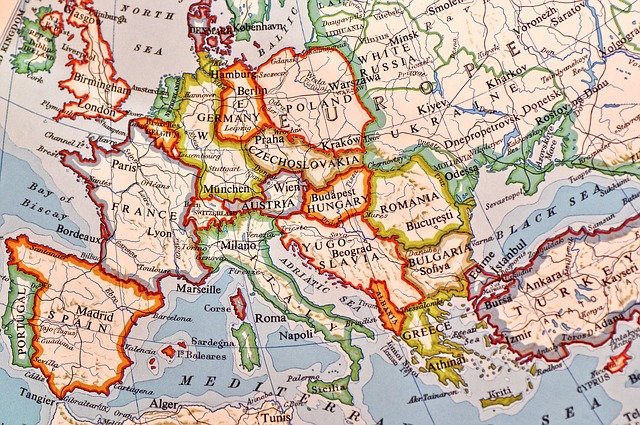Is Italian difficult? Is it easier than French? Or is it the other way around? Choosing which language you should learn can be pretty challenging. If you want to dispel your doubts, this article is what you need. Here’s what you’ll discover:
- Is Italian difficult to learn?
- Is it worth studying Italian?
- Which language is the most difficult: Italian or French?
- How to choose which language to study between Italian and French;
- Is it a good idea to study Italian and French at the same time?
- How to study Italian or French online with Global General.
Read on to learn more about Italian and French and how to choose which one you should study!
Is the Italian Language Any Difficult to Learn?
Language-learning is not an exact science. It is highly subjective, so it’s almost impossible to say whether a language is difficult or not. There are many factors to take into consideration.
What’s your mother tongue? If your native language is Spanish, learning Italian will be quite easy, since they both have Latin origins. On the other hand, if your mother tongue it’s German, or English, it could be more difficult.
Do you already speak other languages? People who speak many languages have more flexibility and can easily learn new ones. So, if you are bilingual, learning Italian will be simple.
How much time you are planning to dedicate to studying will determine how much time it will take to learn Italian. If you study just one hour per week, learning Italian will probably be difficult and take a long time. On the contrary, if you are ready to commit and practice every day, the learning process will be easier and faster.
Are you motivated? Last but not least, motivation is essential to learn a new language. Like anything else, learning Italian will be easy, fast and enjoyable if you are motivated. But if you aren’t it will be very difficult.
You can also easily allow your children to learn Italian, it will not be very difficult for them!
You guessed it, there’s no universal answer to the question “Is Italian difficult to learn”, but we hope we helped you figure out your personal reply: try to answer all of the questions of this paragraph and you’ll have your own answer.
Is It Worth Studying Italian? Benefits and Advantages
Italian is an amazing Romance language: its roots date back to the Roman Empire, and it changed over the centuries up to the present day.
Speaking Italian will enable you to talk to many people: indeed, Italian is the official language in Italy, Switzerland (Ticino and the Grisons), San Marino, and Vatican City. Moreover, it has an official minority status in western Istria (Croatia and Slovenia) and people from Corsica and Romania can understand a bit of it.
Coming directly from Latin, Italian has many similarities to other Romance languages such as Spanish, French and Portugues. These four languages are quite similar, so you will be able to learn them easily once you speak Italian.
What’s more, Latin is the official language of science and medicine: knowing Italian will give you access to many technical terms used by doctors and scientists. If you study medicine, biology, or chemistry for example, it will make your life much easier!
Finally, Italy is an amazing country: if you learn Italian, you will be able to visit Italy and experience it like a local. You will be able to understand and communicate with Italian people, visit museums with a local guide, order Italian food at the restaurant…in Italian!

Which Language Is the Most Difficult: Italian or French?
Italian and French are two amazing Romance languages. They both have Latin roots, so they use the same alphabet and basic grammar structures. These two languages are actually quite alike and Italian and French speakers often understand each other pretty well and find it easy to learn the other language.
- They both use the structure: subject + verb + complements (even though in Italian the subject can be omitted, while in French you must always use it).
- The verbs have the same tenses and modes and they both decline articles, names and adjectives according to genre and number.
- Italian and French vocabulary have many similarities: several words are almost the same and many others are quite alike.
- They both use accents, but French has a couple more: Italian has only acute accent and grave accent, while French also uses circumflex accent and diaeresis.
- The main difference is in pronunciation: French pronunciation is considered to be the most difficult among the Romance languages, because it has some very unusual sounds we don’t have in English.
- The Italian “r” and the French “r” are very, very different: they are both difficult for a native-English speaker.
To sum up, both Italian and French can be pretty difficult for an English speaker, but being so similar, neither of them is considered to be much more difficult than the other.
How to Choose Which Language to Study Between Italian and French
If you are still looking for reasons to choose one language or the other, here are some criteria you can use to make your decision: Italian or French?
Which one is spoken in the countries you want to study or work in?
If your dream has always been to live and work in Italy then you should learn Italian. If you want to make a career in Paris, then French is the right choice for you! Do you love Canadians woods? French! Pizza for dinner is the best you could ask for? Just pick Italian! It’s easy, isn’t it? Choose the language depending on the country it is spoken in: if you have no interest in visiting Italy or working with Italian industries, why should you learn it? Study what you are passionate about!
Which one do you prefer?
Do you prefer the French or the Italian accent? Which one do you find more romantic? Do you prefer the Italian “r” or the French “r”? When you study a language, you have to commit to it, dedicate time and energy and be patient. So, pick the one you prefer: it has to be a pleasure, not a torture! Motivation is essential!
Which one is more difficult for a native-English speaker?
As we mentioned in the previous section, Italian and French are quite similar. There’s no big difference between them for a native-English speaker. French pronunciation is maybe a bit more difficult, since they have sounds we don’t have in English and sometimes words written in different ways are actually pronounced the same way. So maybe, if pronunciation is not your strong suit, French would be more difficult than Italian.
Is It a Good Idea to Study Italian and French at the Same Time?
There are two opposing schools regarding this debate. Some people think that studying two languages which are so alike can create confusion and that you’ll end up mixing everything: grammar, vocabulary, pronunciation, and so on.
Other students say that learning two similar languages at the same time was really helpful, because they are like two parallel tracks. Knowing how to say “friend” in Italian makes guessing the French word for it easier (“amico” and “ami”), or the verb “to sleep” (“dormire” and “dormir”), and so on.
So, once again, it depends on you. Do you think you would be confused or do you think you can handle this and even benefit from studying Italian and French at the same time? It’s up to you!
We think that if you use the right method you can learn both of them at once. For instance, you could take a look at our guide on learning Italian from scratch or our beginners’ guide on learning Italian.

How to Study Italian or French Online With Global General
What’s the best method to learn Italian, or French, or both of them? You guessed it, it’s Global General! There are plenty of resources for learning Italian online, however Global General is unrivaled. This e-learning method developed by GlobalExam allows students to learn online, whenever and wherever they feel like studying, at their own pace. It is tailored for beginners and intermediate-level students to learn Italian, French, English, Spanish, and German. Every language goes from the A1 to the B2 level and is developed according to the CEFR standards.
Try Global General to study French or Italian remotely, with the support of native coaches and high quality content! You can choose the competencies you want to focus on more, repeat the exercises you feel insecure about, improve thanks to the corrections and personalised feedback of our coaches, and much more! Practice anytime you want: you just need your laptop or tablet and an internet connection!
What will you find on Global General?
Here’s what we offer:
- Flashcards to help you train your memory and learn new vocabulary in a fast and fun way!
- Simulations to practice your language skills in real context, for all the competencies, through speaking, reading and listening exercises;
- Exercises for grammar, vocabulary and listening comprehension;
- 5000 detailed corrections in your language;
- Personalised feedback from our native-speaking coaches;
- Online conferences with our native coaches, with a practical component where you’ll be required to complete some exercises and you’ll be given personalized corrections;
- Validation of the acquired competencies every 5 simulations with certificates;
- Scores for every exercise to help you understand your level and progress;
Sign up now and start learning with Global General by GlobalExam!



